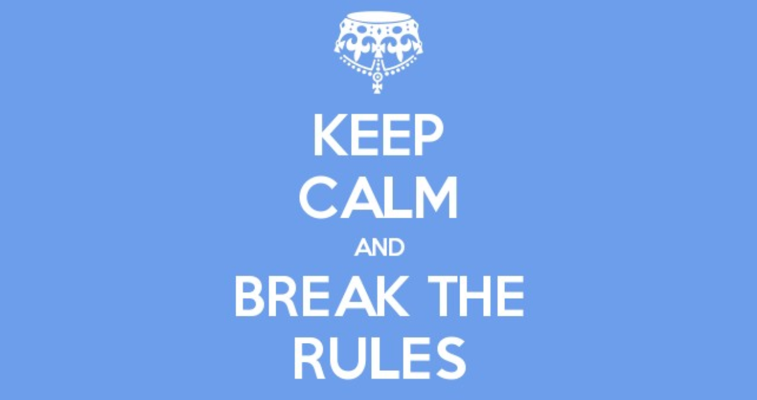I have always been a huge fan of “ask forgiveness, not permission.” I have also been incredibly fortunate to work with a group of people who share a similar mindset. It is not lost on me that not every company supports the rule breakers, and not every employee feels confident to break them even if they think it’s the right thing to do.
Let’s start here: not every rule is meant to be broken. For example, I’m pretty happy there are banking rules in place that protect our hard-earned money. However, understanding which rules you can and can’t break sits at the heart of some potentially profound progress and innovation. That said if we look at some of our most notable innovators - think Jobs, Branson, von Furstenberg - we know none of them found ultimate success by asking a whole lot of permission. It might be high time you toss the rule book aside and start blazing your own trail.
A FEW RULES TO CONSIDER BREAKING
RULE: Climb the career ladder.
Especially in American culture, there is a premium placed on making a great salary and holding an impressive title. While that might truly drive some people, this focus causes many to bypass what’s super important to them. I’ve known a tremendous number of people who drive themselves into the ground chasing the next promotion, not because they are passionate about the work they are doing, but because it allows them to stay a step ahead of their “competition.” When we focus solely on getting ahead, we risk veering away from what truly interests us. In other words, take a pause to reflect on what your real motivation is. If it’s different than what your continued upward trajectory looks like, break the career ladder rule and pursue the path that will fulfill you more deeply.
RULE: We don’t do it that way here.
One of the benefits of bringing new people onto your team is to broaden the ideas and learn from their perspective. When fresh ideas are met with “We don’t do it that way,” it can be a horribly demotivating experience for that person. If you are the one with the new idea, politely ask “Why do you do it that way?” Seek to gain understanding before you decide to push your new idea. And if you are the one blocking those new ideas because you either like your current process or don’t want to deal with change, try to stop yourself before you say no. Perhaps start by talking to the person asking about why the current process exists. Then ask if they have input or a different point of view. Rather than getting defensive, this is a fantastic opportunity to see if any continuous improvement might be available.
RULE: You can’t have it all.
My entire career has been filled with people trying to convince me that I can’t have it all. All that does is fuel my desire to prove them wrong. What does “having it all” even mean? The answer looks different for everyone. If I’m passionate about what I am trying to accomplish in my life, who are you to tell me I shouldn’t be going after it? It no doubt takes a fair amount of organization, prioritization, and sacrifice, but if your aspirations are physically attainable, break the rule that suggests you can’t have it all.
RULE: Face time matters.
Early on in my career, some of us would literally sleep under our desks to prove how committed we were to our growing company. There was a premium put on the number of hours we worked, and those who left first was deemed a slacker. It wasn’t until I left that environment that I realized how counterproductive that behavior was. Hours don’t count; impact does. I’ve yet to meet a leader who doesn’t respect the person who can absolutely slay in their job, and then leave to go eat dinner with their family. Break the rule of the need for face time by using your time as productively as possible, and adding the most impact you can.
RULE: Keep it to yourself.
I hate this rule. It never serves people well at work OR in life. Of course you want to be respectful and thoughtful about the way you share, but never be timid about expressing your thoughts, ideas, or, most importantly, your concerns. Stop making excuses for why you can’t share, and find the courage to speak up. Worst case scenario: no action is taken. Is that really that big of a deal? At least you’ve displayed your interest in bettering your team and/or company. On the best case side, perhaps you’ve just shared the next great idea.
There are a multitude of rules to break in business and in life, and we are all capable of summoning the courage to break them. Do your best to understand what the boundaries are, and be mindful and respectful of how you go about pushing them. If you screw up something along the way, it likely won’t be monumental. You might find a sincere “I’m sorry” works well. But finding the courage to break a rule that pushes the boundaries to move things forward might just fuel you to break a few more. And maybe, just maybe, you’ll become the next great rule breaker of your generation.
Christina Luconi is Chief People Officer for Rapid7. Follow her on Twitter: @peopleinnovator.

